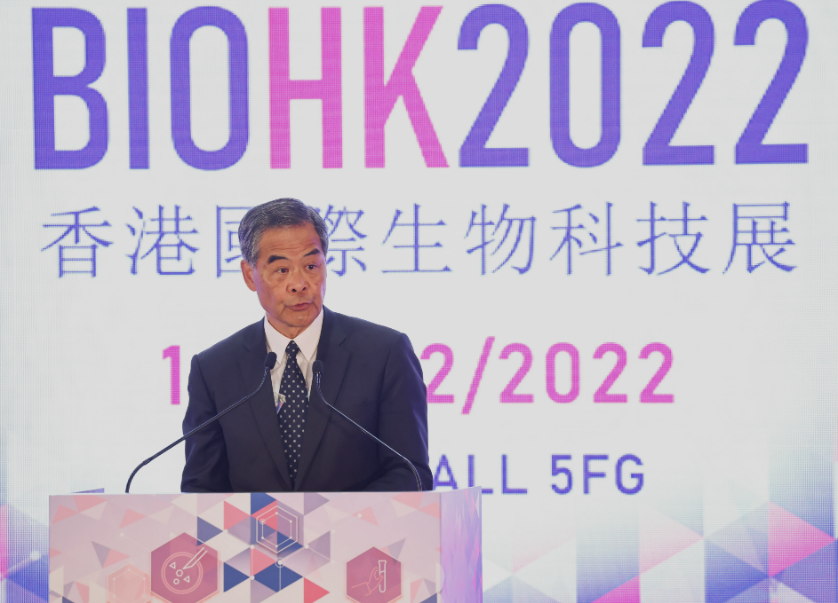- Continuous improvement in Hong Kong’s tech sectors cannot be separated from ‘support of its motherland’, Hong Kong Biotechnology Organization executive says
- Former Hong Kong leader CY Leung tells convention that future of technology innovation should be spoken about and executed ‘not on a local, but on a national level’

Hong Kong’s life sciences and healthcare (LSHS) sectors are poised for the growth in 2023 after the city and mainland China remove the final restrictions on cross-border travel, enabling the broader economy to return to pre-Covid-19 growth, according to speakers at an industry conference and a sector study published by Deloitte.
“Biotechnology has become a hot topic in LSHC,” Albert Yu, chair of the non-profit Hong Kong Biotechnology Organization (HKBIO), said on Wednesday. “The continuous improvement of Hong Kong’s technological strength cannot be separated from the support of its motherland. It must fully integrate into the development of the Greater Bay Area [GBA] and not only rely on its own capital to enter biotechnology’s global stage.”
HKBIO is currently organising the three-day BIOHK2022 convention, which is “a door to Hong Kong’s biotechnology sector as part of its mission to become an international innovation and technology centre”, Yu said.
The emphasis on the broader Chinese economy comes amid expectations that China’s LSHC sector might see more capital flowing into private general hospitals, with increased deployments in second and third-tier cities, according to Deloitte’s 2023 China LSHC Investment and M&A Market Outlook report, which was released at BIOHK2022. Specialist hospitals in areas such as medical cosmetology, dental treatment, assisted reproduction and paediatrics will also see more inflows of cash.
Mergers and acquisitions (M&A) in China’s LSHC sector picked up in 2021, with 262 transactions, 71 more than in 2020. Transaction value increased by 27.9 per cent year on year to US$28 billion, and there were 108 transactions of more than US$100 million, more than half of these in biotechnology and pharmaceuticals. M&A activity then eased off in the first half of 2022, with 99 deals, down from 115 in the first six months of 2021.
“M&A and investment and financing in China’s LSHC sector is expected to grow steadily over the next few years,” said Kenneth Law, Deloitte China LSHC financial advisory partner. “This will be driven by policy support, including LSHC’s status as a key industry to be developed during the 14th Five-Year Plan period and the Healthy China 2030 initiative.”
Another driver for Hong Kong’s science and technology sector is its investment hub status. The city is well positioned to be a world leader on the initial public offerings front and in the biotechnology and healthcare sectors, according to Wilfred Yiu, chief operations officer and co-head of markets at bourse operator Hong Kong Exchanges and Clearing (HKEX).
Hong Kong remains the world’s second-largest fundraising hub for biotechnology and the largest in Asia, according to Bloomberg. Biotechnology listings in the city raised US$12.6 billion last year compared with the United States’ record US$18 billion.
Healthcare and biotechnology companies choose Hong Kong as a result of its liquid market and access to investors, Yiu said in a keynote address. He added that HKEX is committed to enhancing the attractiveness and diversity of its markets by adopting mechanisms such as the Stock Connect schemes, which allow investors to enter the mainland Chinese markets and vice versa.
Hong Kong’s biotechnology hub status must continue a collaborative relationship with mainland China, the convention heard.
CY Leung, the former Hong Kong leader and vice-chairman of the Chinese People’s Political Consultative Conference, said the future of technology innovation should be spoken about and executed “not on a local, but on a national level”.
“The [Lok Ma Chau] loop should be carried out on a national level, not on the Hong Kong or GBA level,” Leung said, referring to the 87-hectare development zone that was set aside in 2017 to be used by the Shenzhen and Hong Kong governments for jointly developing an innovation and technology hub.
The Lok Ma Chau Loop scheme is one example that can offer the city many advantages in terms of collaboration with the mainland and this relationship should be strengthened, Leung added.
Hong Kong is a great place for science and the bio-economy, which is going to be “the most important engine” for growing Hong Kong’s economy in the next few decades, George Hara, chairman and CEO of Defta Partners, said in another keynote session.
The city is home to many outstanding universities that focus on medical science and technology, Hara said. He, however, noted one shortcoming – that most graduates choose to work for banks or financial institutions.
The biggest challenge for financial hubs like Hong Kong is creating space for quality graduates to find careers in companies that are based in biotechnology and the biosciences, he added.
Published by Mia Castagnone
Articles from SCMP, please visit the original SCMP page for more: https://www.scmp.com/business/china-business/article/3203299/hong-kongs-life-sciences-and-healthcare-sectors-are-poised-growth-city-mainland-china-axe-covid-19?module=perpetual_scroll_0&pgtype=article&campaign=3203299

